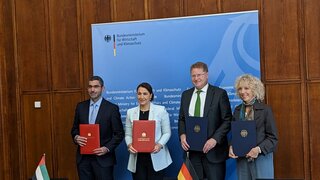Germany and UAE expand Energy Partnership to climate cooperation

State Secretary Dr. Patrick Graichen has agreed to strengthen bilateral cooperation on climate issues with the United Arab Emirates (UAE). An agreement was signed at the sidelines of the visit of UAE Minister of Climate Change and Environment Mariam Al Mheiri to Berlin. Accordingly, the close bilateral Energy Partnership will be expanded to include a climate pillar. Jennifer Lee Morgan, State Secretary and Special Envoy for International Climate Action, and Sharif Al Olama, Undersecretary for Energy and Petroleum Affairs, attended the signing as representatives of the Federal Foreign Office and the Emirati Ministry of Energy and Infrastructure.
The UAE, seat country of the International Renewable Energy Agency (IRENA), is pursuing a net-zero emission target by 2050 and is hosting the 28th UNFCCC climate conference in 2023. As part of the Emirati-German Energy and Climate Partnership, Germany and the UAE will collaborate closely in the areas:
- Net-zero implementation, sectoral decarbonization plans, NDC and climate legislation
- Carbon pricing, carbon certification and international Climate Club
- Cooperation on COP27 in Egypt and COP28 in UAE
- Climate adaption, e.g. Abu Dhabi Mangrove Initiative
- Support of implementation of concrete projects
Germany and the UAE have been working together closely within the Emirati-German Energy Partnership since 2017 focusing on the areas of hydrogen, renewable energies and their system integration and energy efficiency. Under the umbrella of the Energy Partnership, the Bilateral Task Force on Hydrogen and Synthetic Fuels was established in 2021 to support collaboration between companies, research institutes and politicians in the field of hydrogen. During the visit of Minister Dr. Robert Habeck on 21 March 2022 to the UAE, the establishment of a hydrogen supply chain between Germany and the UAE was agreed. The first test deliveries of ammonia are to be received in Hamburg on October 21.
As part of its economic diversification strategy, the UAE is pursuing the expansion of renewable energies and hydrogen production. 148 billion Euros of investment are planned by 2050 for the implementation of the decarbonization strategy. The UAE is targeting 25% market share for low-carbon hydrogen in key export markets by 2030. Along with Japan and South Korea, Germany has been set out as key sales market for hydrogen. The Fraunhofer Society and the Energy and Climate Partnership, are supporting the development of the UAE National Hydrogen Strategy.
The Energy and Climate Partnership is a joint initiative of the German Federal Ministry for Economic Affairs and Climate Action, the Ministry of Energy and Infrastructure and the Ministry of Climate Change and Environment of the UAE, supported by Guidehouse and the German-Emirati Joint Council for Industry and Commerce (AHK).